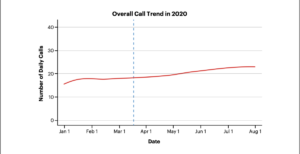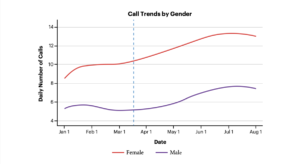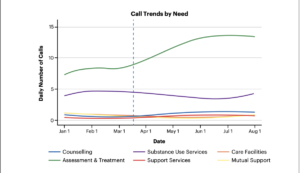

Torontonians struggled with mental health issues during COVID-19 first wave
HealthNewsToronto Apr 8, 2022 Maria Pimentel

The COVID-19 pandemic has marked a before and after in the social perception of mental health.
A study made by the Wellesley Institute shows that Torontonians suffered high rates of need for access to mental health support during the first wave of the pandemic.
In 2020, Findhelp Information Services 211, a program that helps Toronto residents connect to government and community-based health and social services, received a total of 3,924 calls made from January 1 to July 31. 1,215 calls were made before the state of emergency called on March 17, and 2,709 afterwards.
“I think everyone thought the first wave would be the last, then we thought the 3rd wave would be the last, thanks to vaccines, and now, it’s not clear where we’re going from here,” says Toronto health and science journalist Wendy Glauser. “I think the uncertainty about the future is what has most negatively impacted people’s mental health.”
The pandemic and containment measures have had a rapid effect on mental health and well-being, causing feelings of loneliness and fear and increasing symptoms of depression and anxiety in parts of the population. While the 211 received the most calls from female-identifying people, the number of calls from male-identifying people was also considerable.
Prior to March 17, 62 per cent of calls came from females, with men making up the remaining 38 per cent. However, after the state of emergency, calls from men rose 2 per cent. The data shows that calls from males increased from 3.7 to 6.3 per day. For females, the increase was from 7.8 to 12 calls a day.
The study found that the majority of callers used the helpline to get a referral for a mental health assessment and treatment both before the declared state of emergency and after. The following graphic shows the trend in calls regarding the different needs.
Glauser says there hasn’t been enough public recognition from politicians and other leaders about how hard the pandemic has been for people.
“I think the narrative that was promoted was that you shouldn’t ‘complain’ about these things or you didn’t care about saving lives.”
The data shows that the volume of calls aligns with the increase in adverse mental health outcomes across international studies since the start of the pandemic.
“Not only did the daily number of calls increase, but there was clearly a strong take-off point where increases began to occur with greater frequency. This underscores the need for crisis planning, and for capacity of the system to exceed current need so that it can react to times of crisis,” wrote Vinusha Gunaseelan and James Iveniuk in the study.
As COVID-19 continues to be an issue, Canadians keep struggling with their mental health. In a poll released by the Canadian Mental Health Association in February, it states that 24 per cent of Ontarians have sought help for mental health related issues, compared to the 9 per cent almost two years ago.









